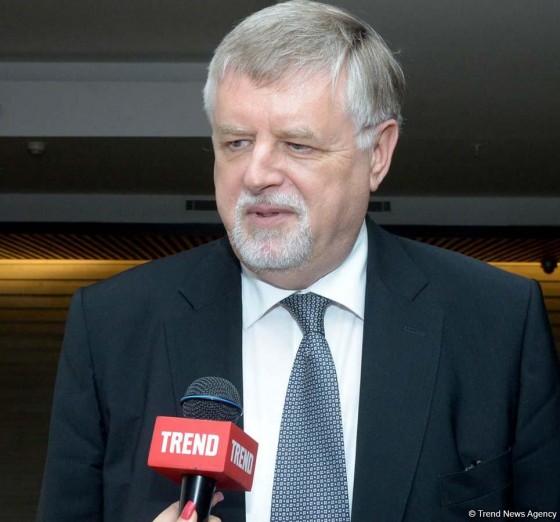
The main stage of negotiations on the strategic partnership agreement between the EU and Azerbaijan will be completed in summer 2016, said Herbert Salber, the EU special representative for South Caucasus, in an exclusive interview with Trend in Baku March 17.
He said the new strategic partnership agreement between EU and Azerbaijan is bound to cover all the potential areas of cooperation.
Salber added that the issue of the Nagorno-Karabakh conflict will be raised in the agreement.
The EU representative also said that whenever the EU negotiates an agreement on behalf of member states, the negotiations have to get their mandate.
Salber added that once the mandate is there, concrete negotiations on the new strategic partnership agreement between EU and Azerbaijan will start.
Salber also positively assessed his visit to Azerbaijan.
“I had meetings with Azerbaijani President Ilham Aliyev, Foreign Minister Elmar Mammadyarov,” he said. “I covered a big spectrum of interest for me.”
“During the meetings, we discussed the Nagorno-Karabakh conflict settlement, few issues that followed up to the visit of Federica Mogherini, vice-president of the European Commission, high representative of the EU for foreign affairs and security policy,” he said.
He also said the relations between the EU and Azerbaijan have good prospects, adding that Mogherini’s recent visit to Azerbaijan confirmed the willingness of both sides to develop the bilateral cooperation.
Further speaking about the Nagorno-Karabakh conflict, Salber said the settlement must be achieved first and foremost by the both parties involved.
“International community can make proposals for settlement of the conflict,” he said. “But the choice should be made by the actors involved.”
“The negotiations on the conflict settlement have been lasting for more than 20 years,” said Salber. “All the potential proposals have been on the table. This is the matter of making choice.”
The conflict between the two South Caucasus countries began in 1988 when Armenia made territorial claims against Azerbaijan. As a result of the ensuing war, in 1992 Armenian armed forces occupied 20 percent of Azerbaijan, including the Nagorno-Karabakh region and seven surrounding districts.
The two countries signed a ceasefire agreement in 1994. The co-chairs of the OSCE Minsk Group, Russia, France and the US are currently holding peace negotiations.
Armenia has not yet implemented the UN Security Council’s four resolutions on withdrawal of its armed forces from the Nagorno-Karabakh and the surrounding districts.
—
Follow the author on Twitter: @Anahanum
Trend
